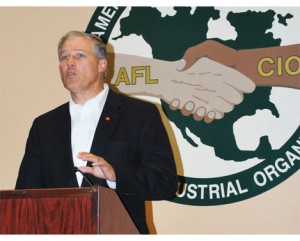STATE GOVERNMENT
Gov. Inslee wary of expanding investor rights in trade deals
 OLYMPIA (Dec. 16, 2014) — Gov. Jay Inslee sent a letter last week to U.S. trade negotiators expressing concerns about Investor-State Dispute Settlement (ISDS), a controversial provision in three major pending trade agreements. ISDS is a legal provision that has been quietly included in trade agreements over the last few decades that significantly expands the rights of foreign investors by allowing foreign corporations to sue governments when regulations reduce future profits, by creating corporate-friendly tribunals to hear these claims; and by setting standards that put investor rights above public interest.
OLYMPIA (Dec. 16, 2014) — Gov. Jay Inslee sent a letter last week to U.S. trade negotiators expressing concerns about Investor-State Dispute Settlement (ISDS), a controversial provision in three major pending trade agreements. ISDS is a legal provision that has been quietly included in trade agreements over the last few decades that significantly expands the rights of foreign investors by allowing foreign corporations to sue governments when regulations reduce future profits, by creating corporate-friendly tribunals to hear these claims; and by setting standards that put investor rights above public interest.
The Washington Fair Trade Coalition says these provisions put taxpayers at risk for long legal battles and costly damage awards. Plus, they have a chilling effect on state and national policy-makers, making them think twice before passing public health and environmental regulations.
In his letter to U.S. Trade Representative Michael Froman, which was also sent to Washington’s Congressional delegation, Gov. Inslee emphasizes these risks:
In its current form, the liabilities of investor-state provisions outweigh their potential value. It certainly appears that we are susceptible to losing a case if the legal reasoning used in favor of U.S. investors under certain cases in the past were to be applied against our country’s policies in the future.
Under NAFTA alone, Mexico has already paid more than $200 million in penalties while Canada has shelled out $157 million, with billions of dollars still in dispute.
ISDS was originally promoted as a way of encouraging foreign investment by providing protections for investors. Instead, it has become a powerful tool by which corporations are challenging social and environmental policy, creating new corporate rights but no responsibilities. Both the United Nations and the International Monetary Fund have warned that investor rights in trade agreements can severely curb a government’s ability to respond in times of financial crisis.
Recent trade challenges include lawsuits by a Swedish nuclear power producer against Germany’s decision to phase out nuclear power in the wake of the Fukushima meltdown; a $2 billion lawsuit by U.S. tobacco giant Philip Morris against Uruguay for their requirement that cigarettes are sold in plain packaging, which has already resulted in a weakening of the regulations; and a $250 million lawsuit against Quebec’s moratorium on fracking under their principal waterway, the St. Lawrence Seaway, by a fracking company incorporated in the U.S. but with all of its operations in Canada. More than 500 dispute settlement claims have been filed and the number is growing rapidly.
To worsen matters, language has been proposed for these new trade agreements that would require any government regulation pass a “necessity test,” outlawing any regulation that is “more burdensome than necessary to ensure the quality of the service.”
As Gov. Inslee pointed out in his letter, “States maintain many nondiscriminatory regulations to advance important policy objectives that are not related to the quality of service at issue, including those related to environmental protection, land use, labor standards, fair competition and economic development. U.S. law generally permits states to pass nondiscriminatory rules related to such considerations that may burden economic transactions, as long as a rational basis for these rules can be demonstrated. Adopting a necessity test could alter this basic principle and improperly replace it with a standard less deferential to state authority.” (Emphasis added)
Recent opposition to ISDS comes from the libertarian Cato Institute, and hundreds of organizations representing civil society in the U.S. and in Europe.
For more information, visit the Washington Fair Trade Coalition’s website.





